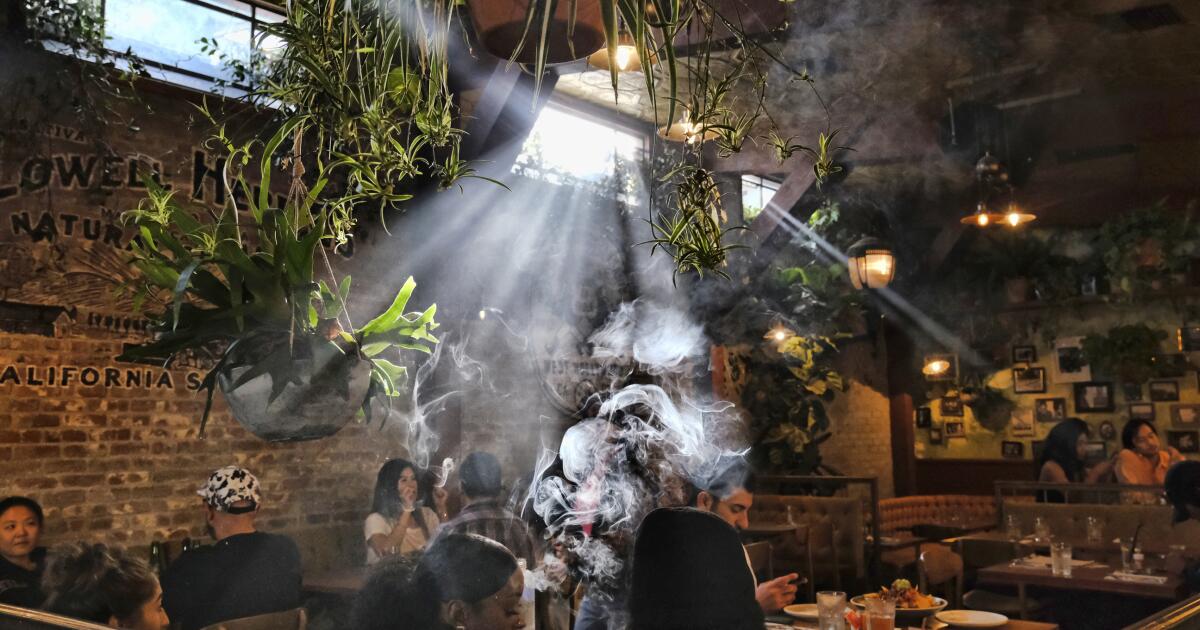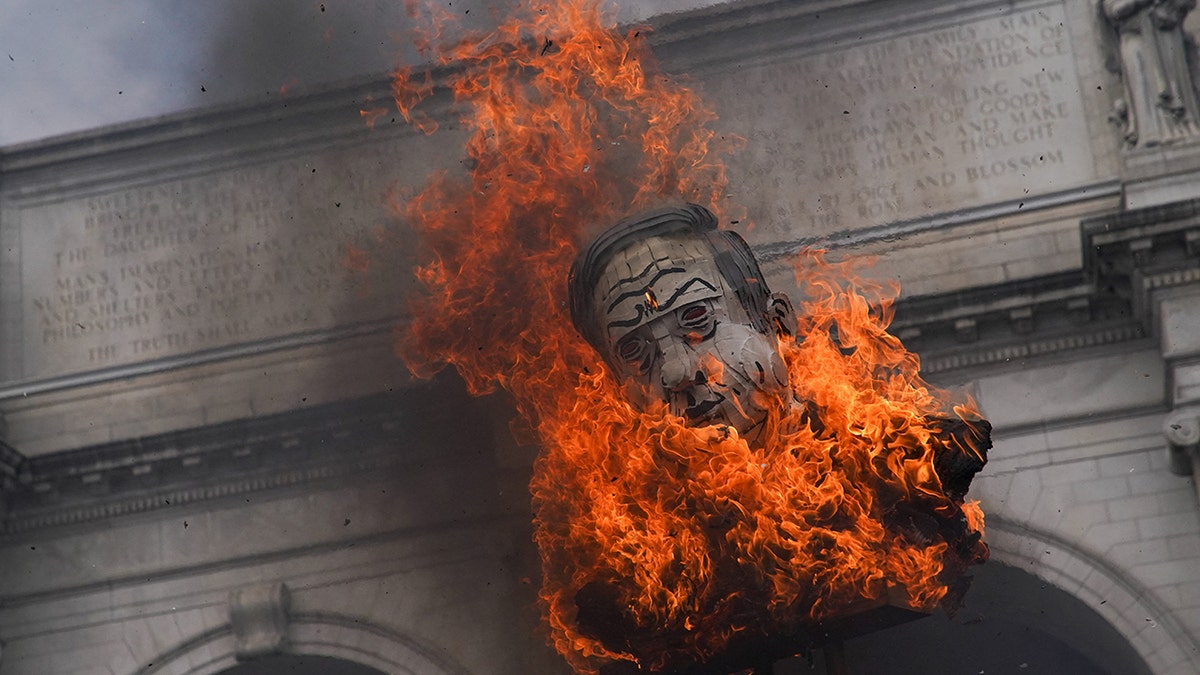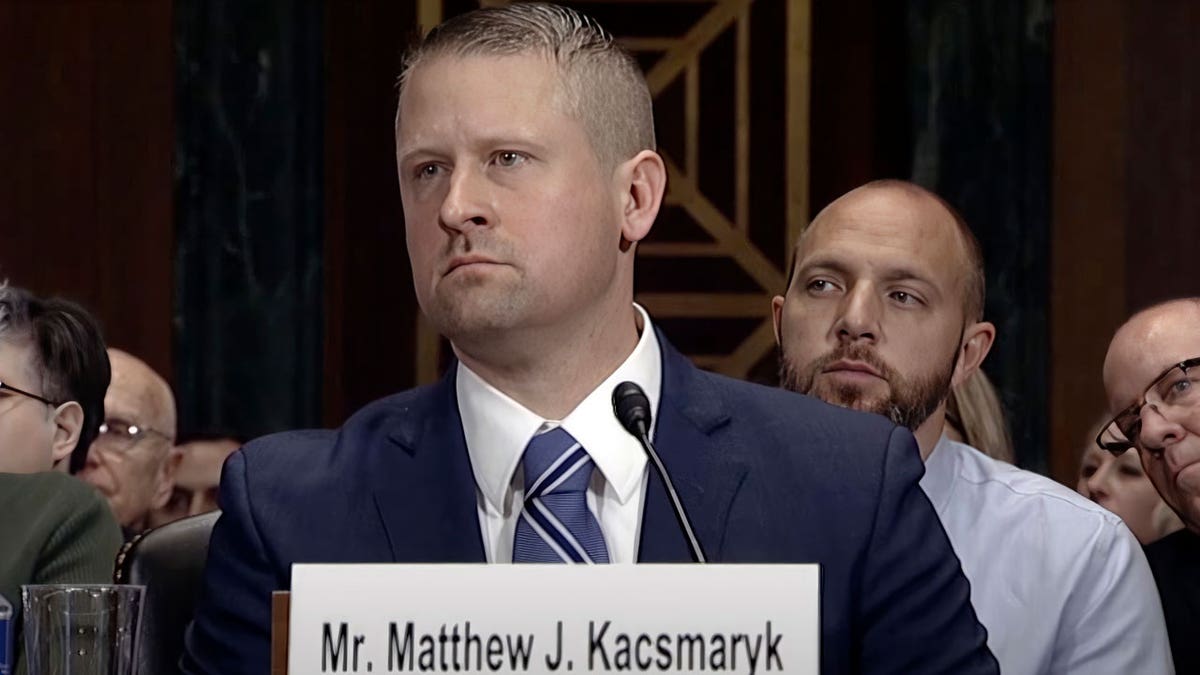Politics
Granderson: Bring on the cannabis cafes, California. Our nation needs them

More Americans now consume marijuana on a daily basis than drink alcohol every day, according to a recent study.
That’s welcome news for an industry that has been unfairly demonized by opportunistic politicians since the days of Nixon. The findings — based on data gathered between 1979 and 2022— are consistent with the wave of decriminalization under state laws, notably with California’s Proposition 215 back in 1996.
Opinion Columnist
LZ Granderson
LZ Granderson writes about culture, politics, sports and navigating life in America.
After the election that year, a law professor at Loyola was quoted in the Los Angeles Times as saying “this may be the baby boomers taking control.”
It wasn’t the boomers prevailing, but pragmatism.
About 1.3 million people in the U.S. are in state prisons. The most common reason for incarceration? Drug-related crimes. Given how much the country with the highest prison population loves pot, it makes sense to stop throwing people in jail for doing weed.
Today the only states where cannabis is totally illegal are Idaho, Kansas, South Carolina and Wyoming. Earlier this month President Biden announced plans to reclassify pot as a less dangerous drug.
In short: “Just say no” is dead. Long live “pass the dutchie ’pon the left-hand side.”
The next important step in having policy actually reflect society would be for Gov. Gavin Newsom to sign the “munchie bill” that’s likely to be headed his way soon.
Last year Assembly Bill 374 — which would make it legal for dispensaries to become cafes and offer food as well as host live events — passed the Assembly 66-9 and the Senate 33-3.
Surprisingly, Newsom vetoed the bipartisan bill in October, citing concerns about providing a smoke-free work environment for employees. That seems nonsensical, considering that it is already legal to consume marijuana in California dispensaries. AB 374 would have just made it possible to buy a bag of chips while you do it.
Marijuana cafes have existed in Amsterdam since the 1970s. Last summer I spent a few hours listening to music and eating homemade desserts at the first marijuana cafe in North America. Fittingly called New Amsterdam Cafe, the popular hangout opened in Vancouver in 1998 and is as chill as Issa Rae’s Hilltop Coffee.
However, vibes are not the only reasons Assemblymember Matt Haney (D-San Francisco) introduced AB 374. For him it’s also a matter of fairness and trying to level the playing field.
“Small businesses have to follow every rule, and yet you’re telling them they can’t adapt and innovate and offer something people want,” he said. “The ones who follow the rules should be able to offer an experience. People pay a lot to sit in a winery. We have cigar lounges. This is really no different.”
Despite law enforcement’s best efforts, illegal pot is estimated to have pulled in more than $8 billion in 2020 compared with $4 billion for legal. However, it’s the small-business owners who also have the burden of taxes, regulations and fines. All of which eats away at profits and businesses’ ability to grow. Haney said his proposal not only would allow small business owners to diversify their income stream, but also would encourage people to come out of their post-pandemic cocoons and socialize again.
California began liberating cannabis culture in 1996. It’s only right the state continues to correct a narrative that was born not from science but from President Nixon’s prejudice. It’s because of that cloud hanging over cannabis that advocates of decriminalization had to sweeten the deal for voters by promising a financial windfall for the state, which of course is why legal pot is ridiculously overtaxed.
Haney said he knows the cafes won’t solve all of the problems that dispensary owners face because of competition from the black market, but it would at least provide owners with more ways to make money. Haney said he worked with both Newsom’s office and the Department of Cannabis Control before reintroducing the bill. He said the new version, AB 1775, addresses the governor’s concern for the work environment, and it also has union support. It recently passed the Assembly 49-4 and is headed to the Senate.
My hope is that the munchie bill meets Newsom’s approval. With proper ventilation for employees and customers alike, marijuana cafes could provide local artists with new venues and add another branch of tourism.
“I’m one of the younger legislators, and I see how excited my friends are,” 42-year-old Haney told me. “I have a couple of colleagues who represent suburban districts and one came to me and said, ‘All the suburban moms are excited about your cannabis cafe bill.’ Post-pandemic, it’s been hard to get people to get out, and I think this just makes sense.”
It really does.

Politics
Park Police union says officers ‘did everything they could’ during DC anti-Israel riot

Following the protests at Union Station by anti-Israel agitators defacing federal property in protest of Israeli Prime Minister Benjamin Netanyahu’s address to Congress, a Park Police union is pushing back against criticism that only a few arrests were made.
Thousands of Hamas-sympathizing agitators descended on Washington, D.C., Tuesday, at one point defacing federal monuments with phrases in support of the terrorist group responsible for the Oct. 7 attacks in Israel, saying, “Hamas is coming.”
Twenty-three people were arrested at the protests, but some have suggested that number should have been higher.
Sen. Marco Rubio, R-Fla., posted on X, “How many more times are they going to allow leftist degenerates who support terrorism and hate America to vandalize property and attack police? There should have been hundreds of arrests today in D.C. not just 23.”
HOUSE REPUBLICANS REPLACE AMERICAN FLAGS AT UNION STATION AFTER ANTI-ISRAEL PROTESTS
The Columbus Memorial Fountain at Union Station during an anti-Israel protest on the day Israeli Prime Minister Benjamin Netanyahu addressed a joint meeting of Congress on Capitol Hill in Washington July 24, 2024. (Reuters/Seth Herald)
But the U.S. Park Police Labor Committee is pushing back.
“Our officers on the ground did everything they could to protect life and property. In fact, despite having only 29 officers available to mitigate damage — 29! — with no additional help from the Department of the Interior, we processed several arrests for charges ranging from assault on a police officer to destruction of government property,” Kenneth Spencer, chairman of the United States Park Police Fraternal Order of Police, said in a statement.
“That’s why it’s so disheartening to hear some members of Congress and members of the media, many of whom describe themselves as ‘champions’ of law enforcement, suggesting that officers gave protesters a ‘pass’ or that insufficient arrests were made.
“Nothing could be further from the truth. Anyone who truly cares to understand the problem would see that our officer staffing crisis is at the root of our agency’s mission readiness. A small unit of 29 officers arrested 10 individuals while being assaulted by a mob of thousands. We simply did not have the staffing or resources to accomplish a mass arrest operation.”
SEE IT: THE MOST DRAMATIC PHOTOS FROM WEDNESDAY’S PRO-HAMAS WASHINGTON, D.C. PROTESTS

An anti-Israel demonstrator sprays graffiti on the Christopher Columbus Memorial Fountain at Union Station on the day of Israeli Prime Minister Benjamin Netanyahu’s address to a joint meeting of Congress on Capitol Hill in Washington July 24, 2024. (Reuters/Nathan Howard)
At least one demonstrator, whose face was covered, was spotted by Fox News carrying what appeared to be the flag of the terrorist group Hamas while others were heard shouting “Allahu Akbar.”
KAMALA HARRIS REACTS TO ANTI-ISRAEL RIOTS AT DC’S UNION STATION

Anti-Israel demonstrators burn an effigy depicting Israeli Prime Minister Benjamin Netanyahu outside Union Station on the day of Netanyahu’s address to a joint meeting of Congress on Capitol Hill in Washington July 24, 2024. (Reuters/Nathan Howard)
The White House condemned the protests Wednesday evening, calling the chaos “disgraceful.”
“Identifying with evil terrorist organizations like Hamas, burning the American flag or forcibly removing the American flag and replacing it with another is disgraceful,” White House spokesperson Andrew Bates said in a comment to Fox News Digital Wednesday evening.
Politics
Ali: Kamala Harris has a campaign soundtrack: Beyoncé's 'Freedom'

Vice President Kamala Harris’ bid for the presidency has a soundtrack: Beyoncé’s “Freedom.”
The leading Democratic presidential candidate took the stage in her first visit to her Wilmington, Del. campaign headquarters and again during her first campaign rally in Wisconsin as the song played.
Now the cathartic anthem graces Harris’ first campaign ad, in which she says: “There are some people who think that we should be a country of chaos, of fear, of hate. But us? We choose something different: We choose freedom.”
Pit that against the musical number her competitor chose for his grand entrance on Night 3 of the Republican National Conference. Donald Trump walked out to James Brown’s “It’s a Man’s, Man’s, Man’s World,” a tone-deaf choice for a former president found liable for sexual abuse, who’s bragged about sexually assaulting women, a married man who paid hush money to a porn star and a former president who rolled back women’s reproductive rights 50 years with the repeal of Roe vs. Wade.
Maybe the Godfather of Soul would have endorsed Trump’s usage of his song, but Brown would be breaking with decades’ worth of musicians who’ve decried GOP candidates playing their tracks at rallies and booster events. Adele, Rihanna, R.E.M., the Rolling Stones, Prince, Neil Young, Guns N’ Roses and Queen are among the many artists who’ve spoken out against Trump using their tunes for campaign purposes.
Heart bristled when the McCain-Palin campaign used “Barracuda.” Tom Petty insisted George W. Bush back away from “I Won’t Back Down.” Bruce Springsteen decried Ronald Reagan’s appropriation of “Born in the U.S.A.”
Beyoncé, however, gave Harris her blessing to use “Freedom,” a single from her 2016 blockbuster album “Lemonade.” The song, which features guest rapper Kendrick Lamar, is an explosive expression of empowerment. At the time of its release, it spoke to public outcry around police killings of unarmed Black men and women — Eric Garner, Tamar Rice, Freddie Gray — and protests that were largely fueled by the ire of younger generations.
Whether Beyoncé was singing about the tyranny of a cheating spouse or racial injustice (or both), the song became an anthem for a new, potentially potent block of the American electorate.
For the first time, Gen Z and millennials could now account for as many votes as baby boomers and their elders, groups that have made up a majority of the electorate for decades.
Folks under 40 have grown up with Beyoncé and her ubiquitous work. Think of Beyoncé like the Who for boomers — their work is everywhere (Republican Sen. Rand Paul played the band’s anti-war hit “Baba O’Riley” when he campaigned in 2015) — or Nirvana for Gen X, except no one cares what we think. Whatever, nevermind.
The Harris campaign’s smart choice of music coincides with a willingness to lean into a meme culture that shot up organically around the 59-year-old VP since President Biden announced Sunday that he was dropping out of the race.
Pop star Charli XCX showed her support for Harris when she tweeted “Kamala IS brat.” The British singer is referring to the TikTok and Twitter edits of Harris’ image superimposed to songs from Charli XCX’s hit album “Brat.” The avalanche of memes come from a video clip in which Harris talks about her mother’s response to the hubris of youth: “You think you just fell out of a coconut tree? You exist in the context of all in which you live and what came before you.”
Right-wing social media used the quote to deride Harris as inarticulate and a “word salad” master, but liberal swaths of Gen Z have since reworked the clip into emojis and memes that celebrate Harris’ nonconformist approach. She’s become a viral sensation, in a good way, unlike J.D. Vance’s damning “single cat lady” memes and a cringey internet joke about encounters with couches.
It’s rare that relevant talent will shill for a Republican candidate. Case in point: Trump’s pop culture ambassadors at this year’s RNC were Kid Rock, Kanye’s ex Amber Rose and former WWE wrestler Hulk Hogan, whose big moment was ripping his shirt off and screaming “Let Trump mania run wild!”
Harris chose to let freedom ring, and she has Queen Bey behind her.
Politics
Texas sues Biden administration over program giving birth control to teens without parents' knowledge

Texas officials are challenging a recent order from President Biden’s administration that would allow schools to distribute birth control to teenagers without parental consent.
Texas Attorney General Ken Paxton announced Thursday that his office is suing the Biden administration over their 2021 change to Title X guidelines banning parental consent requirements for birth control services.
“By attempting to force Texas healthcare providers to offer contraceptives to children without parental consent, the Biden Administration continues to prove they will do anything to implement their extremist agenda — even undermine the Constitution and violate the law,” Paxton said in a statement.
TRUMP SAYS HE ‘WILL NEVER ADVOCATE IMPOSING RESTRICTIONS ON BIRTH CONTROL’ OR OTHER CONTRACEPTIVES
A woman takes the next pill from a monthly pack of contraceptive pills. (Annette Riedl/picture alliance via Getty Images)
The Texas legal battle began in Dec. 2021 when US District Judge Matthew Kacsmaryk ruled that Title X — the federal program that provides free, confidential contraception to anyone regardless of age, income or immigration status — violates parental rights and violates state and federal laws.
The case was argued by former solicitor general of Texas Jonathan Mitchell, representing father Alex Deanda, who said he was “raising each of his daughters in accordance with Christian teaching on matters of sexuality, which requires unmarried children to practice abstinence and refrain from sexual intercourse until marriage.”
SCHUMER PLANS VOTE ON ‘CONSTITUTIONAL RIGHT TO CONTRACEPTION’ IN BID TO PROTECT SENATE DEMOCRAT MAJORITY

Kacsmaryk, a Trump appointee, previously ruled that parents must be informed when birth control is provided to their children under 18 years old. (Senate Judiciary Committee via AP)
In response, the federal government updated guidelines to state that Title X projects “may not require consent of parents or guardians for the provision of services to minors, nor can any Title X project staff notify a parent or guardian before or after a minor has requested and/or received Title X family planning services.”
Paxton is now seeking a permanent injunction on this rule, which he claims defies the findings of the federal court.

Paxton and his wife Angela are pictured outside the Supreme Court. (Bill Clark/CQ-Roll Call, Inc via Getty Images)
Paxton filed the lawsuit in a federal court in Amarillo. It will likely be heard by Kacsmaryk, the same judge who previously ruled parents must be informed of birth control provided to their children.
-

 World1 week ago
World1 week agoOne dead after car crashes into restaurant in Paris
-

 Midwest1 week ago
Midwest1 week agoMichigan rep posts video response to Stephen Colbert's joke about his RNC speech: 'Touché'
-

 News1 week ago
News1 week agoVideo: Young Republicans on Why Their Party Isn’t Reaching Gen Z (And What They Can Do About It)
-

 Movie Reviews1 week ago
Movie Reviews1 week agoMovie Review: A new generation drives into the storm in rousing ‘Twisters’
-

 News1 week ago
News1 week agoIn Milwaukee, Black Voters Struggle to Find a Home With Either Party
-

 Politics1 week ago
Politics1 week agoFox News Politics: The Call is Coming from Inside the House
-

 News1 week ago
News1 week agoVideo: J.D. Vance Accepts Vice-Presidential Nomination
-

 World1 week ago
World1 week agoTrump to take RNC stage for first speech since assassination attempt














